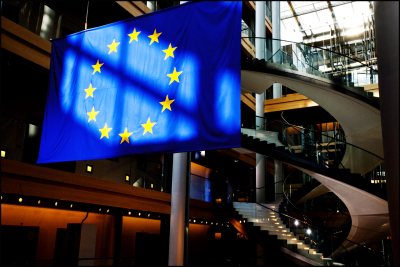In this third edition of our web series on tech lobbying, we have taken an in-depth look at the lobbying activities on 5G, starting with those located in Brussels.
Huawei, a Chinese tech giant, has been at the forefront of a battle for the roll-out of 5G networks across the world. With the promise of lightning-fast connectivity fostering a generational technological leap, comes also the worry of handing over critical infrastructure to a company headquartered in a country deemed authoritarian by the 2018 Democracy Index. The US has been particularly vocal about this subject, launching unsubtle attempts to strong-arm EU Member States to ban Huawei’s technology. Such a ban appears to have been staved off at EU-level until now, with both the Commission and the Parliament opting for compromise measures that call on Member States to exercise caution and perform extensive security assessments.
The EU’s own telecom equipment manufacturers, Eriksson and Nokia lag behind their Chinese counterpart in terms of research & development. The risk being an unwelcome delay in 5G technology, and the growth that would presumably ensue. The need for speedy deployment and geopolitical considerations partially explain the EU’s restrained approach towards Huawei. This ongoing saga, involving billions of investments around the continent, presents the perfect opportunity to analyse 5G related lobbying activities around the EU. In this first chapter, we focus on those based in Brussels and seek to answer a simple question: can we hold decisions-makers to account with the information that is currently published?
Huawei has largest lobbying budget among 5G players
Huawei’s entry on the EU lobby register shows that it spends 2,190,000€ on lobbying activities in Brussels. This is the 3rd largest budget among the big tech companies, though it still trails far behind Google and Microsoft. Among all companies & groups lobbying the EU, the Chinese tech giant still ranks 21st. An impressive figure given that it has only been active in European markets since 2001. Tellingly, it has invested far more in EU lobbying than its competitors: Nokia declares a mere 700,000€ while Ericsson spends 1,250,000€.
While the interests pursued range from the digital economy to research, innovation and taxation, Huawei’s entry also highlights membership of larger business associations in Brussels, such as the 5G Infrastructure Association, in which both Nokia & Ericsson are members. A strategy that closely mimics those of other big tech organisations of not putting all of one’s eggs in the same basket. This is also an example of big tech’s tendency to mass-publicize their lobbying positions. lobbying activities. The recently launched #votefor5G campaign, designed to sway public opinion and decision makers alike of the benefits of Huawei tech, links the success of the EU with the deployment of 5G networks around the continent. Whether such campaigns should be directly reported on the Transparency Register remains an open question as it likely involves far higher costs than currently disclosed.
Huawei has the most lobby meetings on 5G with the Commission
In terms of tracking lobbying activities, the EU’s lobby regulation remains largely incomplete. Only the European Commission is fully committed to publishing high-level meetings with lobbyists, providing a mere snapshot of the full extent of lobbying in Brussels. Nevertheless, current information shows that Huawei has had 42 meetings, 10 of which specifically mention the deployment of 5G technologies. This represents 24% of all 5G related meetings declared, a share that puts it in the top three together with Qualcomm, an American manufacturer of 5G chips for mobile-phones and the 5G automotive association, a large consortium of companies seeking to market self-driving vehicles. Ericsson on the other hand has only 9.5% of its high-level meetings on 5G while Nokia has 6%. The figure could be higher for all three companies as other meetings published by the Commission might also have touched upon the topic without specifically mentioning 5G in its subject.
Parliament and Council: Network unavailable
The situation in the European Parliament is much worse as MEPs and their assistants are not required to publish their meetings. Recent changes in the rules of procedure, championed by us, introduced an obligation for MEPs in charge of legislative files and Committee Chairs to publish their lobby meetings. As these will only come into full fruition during the next legislature, it’s simply not possible for concerned citizens to know the extent of 5G-related lobbying activities. Though journalists have uncovered proof that at least one MEP urged fellow colleagues to vote against a Parliament resolution that voiced concerns on the security implications of using Huawei’s 5G technology. Ironically, the rules would not have applied to this MEP since he was neither in charge of any of the 5G related legislative files nor chair of the responsible committees. This example demonstrates that despite recent and welcome advance in lobby transparency, future MEPs should commit on a pro-active basis to publish their meetings, regardless of their involvement in the legislative process.
Voluntary commitments also appear to be the only way forward for the Council. Given that a majority of EU governments refused to provide any meaningful commitments to enhance lobby transparency in the last 5 years, it currently rest upon individual member states to disclose their meetings, rendering it nigh-on impossible to track 5G related lobbying in the Council. With 11 EU countries slated to start auctioning off the construction of 5G networks this year, and 6 planed for the next, citizens will have to turn to national dispositions on lobbying to hold their representatives to account. Our upcoming analysis on France, the UK, Ireland and Germany will show that lobby transparency varies greatly from country to country. As the EU is ramping-up it’s response to broad strategic concerns that China is not operating on a level-playing field, including in the deployment of 5G, Huawei’s lobbying efforts is likely to intensify in national capitals. National governments around the EU need to engage in serious discussions regarding the regulation of lobbying activities. The digital transformation of our society shows how high the stakes can be when dealing with major tech behemoths. The Huawei case is but one example among many. With it’s mixture of strategic infrastructure and geopolitical considerations, it demonstrates that accountability in decision-making is ever more crucial at both the EU & national level.






